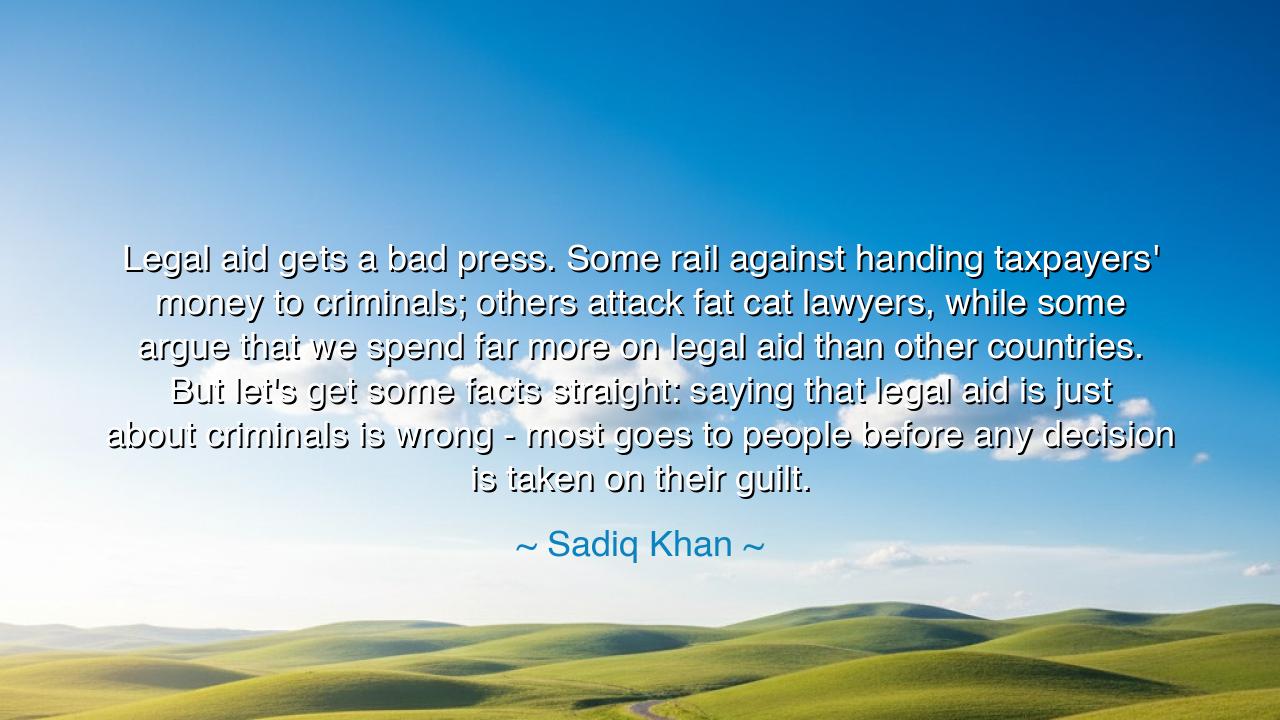
Legal aid gets a bad press. Some rail against handing taxpayers'
Legal aid gets a bad press. Some rail against handing taxpayers' money to criminals; others attack fat cat lawyers, while some argue that we spend far more on legal aid than other countries. But let's get some facts straight: saying that legal aid is just about criminals is wrong - most goes to people before any decision is taken on their guilt.






The words of Sadiq Khan rise as both defense and declaration: “Legal aid gets a bad press. Some rail against handing taxpayers' money to criminals; others attack fat cat lawyers, while some argue that we spend far more on legal aid than other countries. But let's get some facts straight: saying that legal aid is just about criminals is wrong — most goes to people before any decision is taken on their guilt.” In these words burns the eternal flame of justice misunderstood, and the warning that ignorance, when coupled with fear, can corrode the very foundation of fairness. This is not merely a defense of policy — it is a plea for truth, for compassion, and for the remembrance of what law truly means in the heart of a free people.
In every age, there are those who would confuse justice with vengeance. They see the accused and already declare them guilty; they hear of legal aid and assume it is mercy wasted upon the undeserving. Yet Khan reminds us that the essence of justice is not in punishment, but in process — not in condemnation, but in clarity. The legal aid system does not exist to reward crime; it exists to guard the innocent, to ensure that no voice is silenced for lack of wealth, and to uphold the sacred principle that one is innocent until proven guilty. Without such a safeguard, the courtroom becomes a battlefield where only the rich emerge unscathed.
In the days of old, when kings judged their subjects from thrones of marble, the poor man’s plea often died unheard. The noble could purchase eloquence; the peasant could only beg. Thus, injustice wore the crown of power. It was to shatter that ancient imbalance that societies of the modern age built legal aid systems — to ensure that no man, woman, or child would stand alone before the might of the law. The welfare of the accused, before guilt is proven, is not indulgence; it is civilization itself standing against the chaos of prejudice.
History offers a thousand proofs. Consider the case of Dreyfus, the French officer unjustly accused of treason in the nineteenth century. Public fury branded him guilty before evidence could speak. Yet through the perseverance of truth — through lawyers, advocates, and voices who demanded fair trial — his innocence was revealed. Without defenders, he would have perished under false judgment. That is the spirit of legal aid: not to defend sin, but to defend the right of every soul to be heard before condemned.
When Khan speaks of the bad press that legal aid receives, he exposes a sickness in modern discourse — the eagerness to believe rumor over reason, outrage over understanding. The cry of “taxpayers’ money for criminals” is but a mask for fear and impatience. Yet a wise society knows that justice cannot exist without mercy, nor truth without patience. To deny legal aid to the accused is to deny the very structure of moral law, for how can guilt be measured if the scales are already tilted?
Legal aid, rightly understood, is not charity — it is a pillar of democracy. It ensures that the law serves all, not just the privileged few. It is an act of faith that the system, though imperfect, seeks balance through fairness. When we protect the rights of the accused, we protect the rights of all, for any one of us might one day stand in their place, pleading not for pity but for justice. Khan’s words remind us that to weaken this system is to tear at the fabric that binds society together — the belief that truth must be given its chance to speak.
So let this be your lesson, child of tomorrow: do not rush to judge, and do not despise those who defend the accused. For the day a society forgets that even the suspected deserve defense, it has already condemned itself to darkness. Instead, nurture understanding — see in every trial a reflection of humanity’s struggle to rise above its fears. Support those who labor in the service of fairness, who stand between the powerless and the machinery of the law. For they are the keepers of civilization’s flame.
Thus, in the spirit of Sadiq Khan’s wisdom, let us stand firm in defense of justice tempered by compassion. Let us teach that legal aid is not a handout to the guilty, but a promise to the innocent. And let every generation remember: the greatness of a nation is not measured by how it treats the virtuous, but by how it protects the accused — until truth, shining like the morning sun, reveals what is just.






AAdministratorAdministrator
Welcome, honored guests. Please leave a comment, we will respond soon